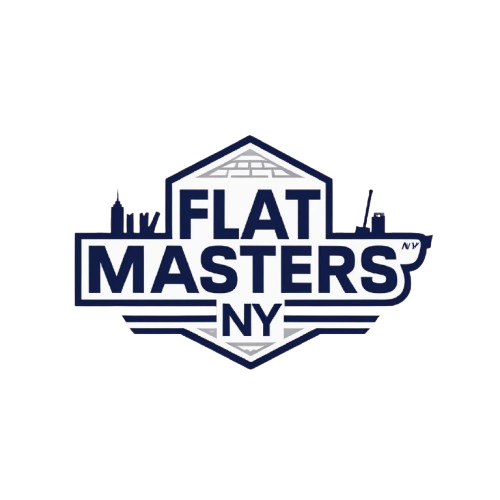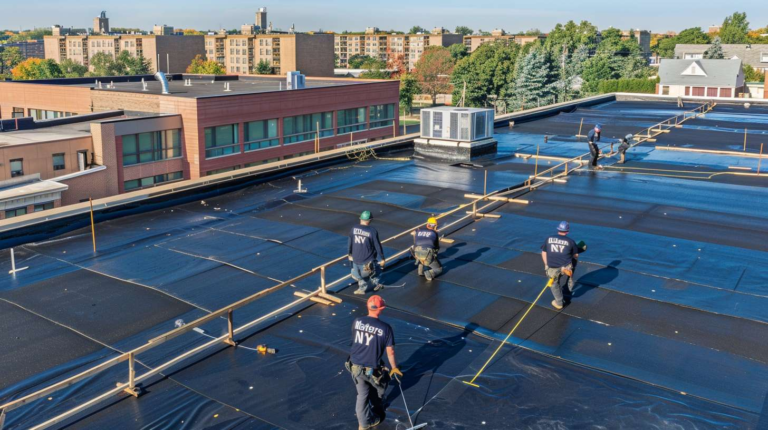Expert Spanish Style Flat Roof Design Services for Your Home
Look, I've been working flat roofs in Queens for over two decades now, and let me tell you something - Spanish style flat roof design is having a real moment in neighborhoods like Forest Hills and Bayside. Just last month we completed three Spanish revival flat roof projects on houses that were built in the 1920s, and honestly, when done right, there's nothing quite like the clean lines and Mediterranean charm these roofs bring to a home.
The thing about Spanish architectural flat roof styles is they're not actually completely flat - that's the first misconception homeowners have when they call us. These roofs typically have a slight slope, maybe 1/4 inch per foot, which is crucial for proper drainage in our Queens climate. I can't tell you how many times I've seen DIY attempts fail because people didn't understand this basic principle.
Understanding Authentic Spanish Revival Flat Roof Design
When we talk about flat Spanish style roof designs, we're really discussing a roofing system that originated in the Mediterranean and was adapted for American homes, particularly during the Spanish Colonial Revival movement of the 1920s and 1930s. Here in Queens, you'll see these roofs on homes in areas like Kew Gardens and Jamaica Estates, where wealthy families built these stunning Mediterranean-inspired houses.
The key characteristics include:
- Low-pitched or nearly flat surfaces with subtle drainage slopes
- Thick parapet walls that hide the roof membrane
- Clay tile coping along the edges
- Built-up roofing systems designed for foot traffic
- Integration with courtyards and outdoor living spaces
At Flat Masters NY, we've developed our expertise working on these systems because they require a completely different approach than your typical flat roof. The membrane systems, the flashing details around those parapets, the way we handle drainage - it's all specialized work.
Modern Materials for Traditional Spanish Style
Here's where things get interesting - and where a lot of contractors get it wrong. Traditional Spanish revival flat roofs used built-up roofing with gravel surfaces, but modern Spanish style flat roof installations benefit from advanced membrane systems that give you that authentic look while providing superior protection.
We typically recommend modified bitumen systems for Spanish revival applications because they handle the thermal movement you get with those thick parapet walls. The expansion and contraction in our Queens summers and winters can be brutal on improperly designed systems. Just last week, my foreman Miguel and I were on a job in Elmhurst where the previous contractor had used EPDM without proper detailing around the parapet - complete disaster.
The membrane choice depends on several factors. TPO works well for new construction Spanish style homes, especially when the homeowner wants that bright white reflective surface that mimics traditional lime stucco roofs. But for historic renovations or when you're trying to maintain that authentic Mediterranean aesthetic, we often go with a granulated cap sheet that gives you that subtle texture and color variation.
Drainage Challenges Unique to Spanish Flat Roofs
Oh, and another thing about drainage on these Spanish architectural flat roof styles - it's not as straightforward as a typical flat roof. The parapet walls create what we call a "bowl" effect, and if you don't design the drainage system correctly, you're asking for trouble.
We always install multiple drains, typically at least one per 1,000 square feet of roof area. The scuppers - those are the openings through the parapet wall - need to be sized properly for our New York rainfall patterns. I've seen too many Spanish revival roofs fail because someone used inadequate drainage design.
The slope design is critical too. We create what's called a "cricket" system, where the roof slopes from all directions toward the drain points. It's like creating a series of subtle valleys that guide water exactly where it needs to go. This isn't something you can just eyeball - we use laser levels and precise calculations.
Parapet Wall Construction and Waterproofing
The parapet walls are really the signature element of Spanish style flat roof design, but they're also the most vulnerable component. These walls extend above the roof surface, and every penetration, every joint, every connection point is a potential leak source.
We use a multi-layer approach for parapet waterproofing. The base flashing goes up the wall at least 8 inches, and we always use a two-piece counterflashing system. The cap flashing covers the top of the parapet and extends down both sides. In Queens, with our freeze-thaw cycles, we also install a vapor retarder behind the parapet to prevent moisture infiltration into the wall assembly.
One detail that separates our work from other contractors - we always install a proper termination bar at the top of the base flashing. I see too many jobs where contractors just rely on sealant, and that's a recipe for failure. The termination bar mechanically fastens the membrane to the wall and creates a positive seal.
Integration with Outdoor Living Spaces
What makes Spanish revival flat roofs really special is how they integrate with outdoor living. These roofs were designed to be usable space - terraces, roof decks, outdoor kitchens. That means the structural design has to handle live loads, and the waterproofing system needs to accommodate foot traffic.
We typically recommend a plaza deck system for occupied Spanish style roofs. This involves a structural deck, the waterproof membrane, a protection layer, and then a wear surface like pavers or tile. The key is creating a system that protects the membrane while allowing access to it for maintenance.
Just finished a project in Forest Hills where we created a rooftop terrace on a 1920s Spanish revival home. The homeowner wanted to maintain the authentic look while adding modern amenities like outdoor lighting and a fire feature. We used a modified bitumen base with a granulated cap sheet, installed a plaza deck system, and finished it with authentic clay pavers. The result looks like it's been there for a century.
Climate Considerations for Queens Spanish Roofs
Look, I don't care what other contractors say about roofing being the same everywhere - Queens has specific climate challenges that affect Spanish style flat roof performance. Our humidity levels, the salt air from Jamaica Bay, the thermal cycling from hot summers to cold winters - it all impacts these roofing systems.
The thermal mass of those thick parapet walls creates unique expansion patterns. We always use expansion joints at regular intervals, and we size them for our local temperature ranges. A roof that works fine in California might fail here because the contractor didn't account for our 100-degree temperature swings.
Snow loading is another consideration that gets overlooked. Spanish revival homes weren't originally designed for snow loads, but here in Queens, we need to handle at least 30 pounds per square foot. That affects both the structural design and the membrane selection.
Why Choose Flat Masters NY for Spanish Style Projects
After 20-plus years specializing in flat roofing throughout Queens, we've developed specific expertise in Spanish architectural flat roof styles. We understand the unique challenges these systems present, and we have the experience to execute them properly.
Our approach starts with a thorough evaluation of the existing structure. Many Spanish revival homes in Queens are approaching their centennial, and we need to assess the condition of the original construction before designing the new roofing system. We work with structural engineers when necessary to ensure the building can handle modern roofing systems and any additional live loads.
We also maintain relationships with suppliers who can provide authentic materials. The clay tiles for parapet coping, the granulated membranes that match historic appearances, the specialized flashing materials - these aren't items you can pick up at the local supply house. We source materials specifically for Spanish revival applications.
Maintenance Requirements for Long-Term Performance
Here's something most homeowners don't think about until it's too late - maintenance on Spanish style flat roofs is different from typical flat roof maintenance. Those parapet walls collect debris, the drainage systems need regular cleaning, and the multiple flashing systems require periodic inspection.
We recommend semi-annual inspections, ideally in spring and fall. The inspection focuses on drainage components, flashing conditions, and membrane integrity. We also check for vegetation growth, which can be a particular problem with Spanish revival roofs because the parapet walls create protected areas where plants can establish.
The good news is that properly installed Spanish style flat roof systems can last 20-25 years with appropriate maintenance. We've maintained roofs we installed in the early 2000s that are still performing excellently. The key is addressing minor issues before they become major problems.
Cost Considerations and Investment Value
Spanish revival flat roof installation costs more than basic flat roofing because of the complexity involved. The parapet work, the specialized drainage design, the multi-layer waterproofing systems - it all adds to the project cost. But the investment is worth it both for performance and property value.
A well-executed Spanish style flat roof significantly enhances curb appeal and can increase property values, especially in neighborhoods where this architectural style is prevalent. We've seen homes in areas like Kew Gardens and Forest Hills command premium prices partly because of authentic Spanish revival roof systems.
The durability factor also makes these roofs a good investment. While the initial cost is higher, the long-term performance and lower maintenance requirements often make Spanish style flat roofs more cost-effective over their lifespan than cheaper alternatives that require frequent repairs or early replacement.
So what's really the best approach for your Spanish style flat roof project? It starts with understanding that these aren't just flat roofs with decorative walls - they're integrated architectural systems that require specialized knowledge and experience. At Flat Masters NY, we've built our reputation on understanding these distinctions and delivering roofing systems that honor the authentic Spanish revival aesthetic while providing modern performance and reliability.
If you're considering a Spanish revival flat roof for your Queens home, or if you need restoration work on an existing Spanish style roof, give us a call. We'll evaluate your specific situation and provide recommendations based on your home's architecture, your performance requirements, and your budget. Because when it comes to Spanish architectural flat roof styles, experience matters, and details make all the difference.


